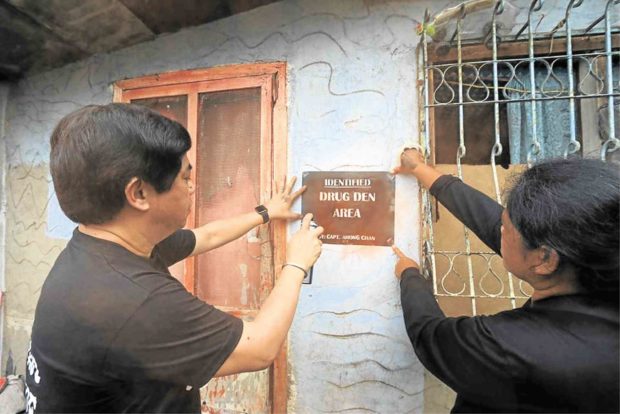Cebu drug campaign tactic: Shame them

SHAME CAMPAIGN Village chief Junard Chan (left) helps install a sign marking a suspected drug den in Barangay Pajo in Lapu-Lapu City, Cebu. —NORMAN V. MENDOZA/CEBU DAILY NEWS
LAPU-LAPU CITY, CEBU — Police and village officials of Pajo here have turned to a shame campaign, similar to a tactic used by the Manila city government in the 1990s, in a bid to solve the drug problem in the village.
On Monday, authorities spray-painted the words — “Identified Drug Den Area” — on the doors of four rooms in an apartment unit owned by Rodolfo Larino in the village.
The shame campaign is the first in Cebu province and reminiscent of former Manila Mayor Alfredo Lim’s campaign in the 1990s which was later declared unconstitutional by the Supreme Court.
The Commission on Human Rights (CHR) in Central Visayas plans to investigate the campaign here to ensure that human rights are safeguarded.
But Junard Chan, village chief of Pajo, said he was willing to be taken to court as long as his barangay would be rid of illegal drugs.
Article continues after this advertisementThe four rooms were allegedly being rented out by Larino’s tenants to drug users at P10 to P20 per person.
Article continues after this advertisementMia, one of the four tenants, was sleeping when she heard someone knocking at 8 a.m. Monday.
When she opened the door, policemen instructed her to cover her face with a piece of cloth as reporters and cameramen surrounded her.
Village and police officials, led by Chan and Senior Supt. Rommel Cabagnot, Lapu-Lapu City police director, went to work, spray-painting the label, in red, on her door.
Mia, who denied allowing drug users to sniff “shabu” (crystal meth) for a fee, could only cry in shame as her neighbors laughed at her.
“They were laughing at me. I was so embarrassed that I cried,” said Mia, who left her native Surigao del Norte for Lapu-Lapu City in 2013 to look for a job.
While admitting she had used illegal drugs, she denied allowing drug sessions to be held in her room.
Chan said they believed that shaming drug suspects was one way to convince them to change their ways.
“We want to instill fear and shame among drug users to encourage them to stop their illegal activities,” he said.
He said the shame campaign in Barangay Pajo would continue until the problem of illegal drugs was solved.
Arvin Odron, CHR regional director, reminded Pajo officials that all anti-illegal drug programs of the government must be consistent with its human rights treaty commitments.
“After all, human rights are protected by laws and the government is obligated to enforce these laws that protect human rights,” he said.
Odron said they might visit the houses that were sprayed with warnings and would get the statements of those subjected to the shame campaign.
He said they would also talk to local officials and the police to remind them that their programs must conform with human rights standards set in international treaties.
“We need to document everything. We know that if a person is labeled or suspected of having connections with illegal drugs, his or her safety and security are automatically compromised. Based on our legal framework, only our courts have the authority to declare the guilt of the accused,” Odron said.
Chan said his reminder to his villagers to stop their involvement in illegal drugs had been ignored.
“We have called their attention many times. They surrendered to authorities, but they still continued to use illegal drugs,” he said.
Chan organized a community-based program and livelihood opportunities, called “New Life Pajoanon,” to help drug surrenderers in his village.
While some surrenderers, he said, now sell empanada (stuffed bread or pastry) in the streets of Lapu-Lapu and earn P500 to P800 daily, others refused to reform and continue using and selling illegal drugs. —Norman V. Mendoza, Morexette Marie Erram and Ador Vincent S. Mayol